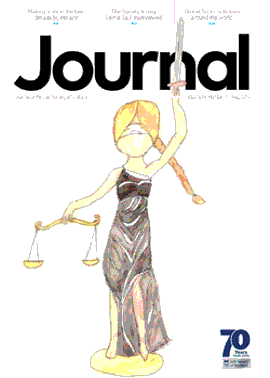A future at 70
Happy birthday to us. The Law Society of Scotland and I were born in the same year. I have been a member for almost two thirds of its existence, served on its Council, and had the odd bust-up. I am an unapologetic fan. It has its faults, but haven’t we all? You need only glance at the Roberton report to be reminded that we should be very careful what we wish for.
Over much of the Society’s early life, the profession sailed serenely, if somewhat pompously on, confident that things would be much the same next year as this: cosseted by scale fees, stuffed with the male and privately educated (how well I remember being effortlessly patronised), unquestioned by clients, whose deference is today unimaginable.
I recall that the Society used to have something called the Organisation & Methods Committee. At one meeting in the 1970s, it deliberated solemnly on the merits of the fax machine, provoking this intervention from the late Jimmy Wark, father of Kirsty, and a wonderful lawyer: “Convener, in my view there is a great deal to be said for second-class post. At least it gives you time to think!” Even the most tech-savvy of us might sometimes find ourselves nodding in agreement.
Tools of the trade
The recession and massive advances in technology have brought more change in the last 15 years than in the preceding 55. How recently so many things we take for granted have come into our lives: iPhone, Alexa, Facebook, Instagram, WhatsApp, Kindle and Netflix, just to scratch the surface. Further back, it is only just over 20 years ago that we were thinking up witty addresses for our cutting edge Hotmail accounts.
We no longer sniff at the thought that law is a business, or the vulgar idea that we need to sell ourselves. Commercial awareness is right at the top of firms’ priorities. Though there is some way to go, we are much better at valuing the vital contribution of non-lawyers in finance, operations, project management, marketing (only 30 years ago, advertising was a hanging offence) and IT. Once, the web was something to do with spiders. Today, in a world where there is more computing power in the iPhone clock than put a man on the moon almost exactly 50 years ago, firms spend eyewatering sums on being ubiquitous online.
As a consequence of these developments and intense competitive pressures, many areas of law once conducted in the laborious, artisanal way that scale fees permitted, have become – dread word – commoditised: debt recovery, personal injury, conveyancing, taking security, wills, executries, and a surprising number of corporate tasks.
The difference today is that whereas this development was once fiercely resisted by elements wedded to the artisan model (they haven’t entirely died out), now it is embraced for what it is – a route to delivering better value to clients and maintaining profitability.
Plus ça change...
We are on notice that galloping developments in AI will decimate middle class jobs, and lawyers will not be immune. If an algorithm can tell in the blink of an eye what a personal injury claim is worth, or give the answer to a complex question of contract law, why employ a fallible human being? New methods, new entrants, new skills required – it’s a daunting world. And yet, there is wisdom in Jean-Baptiste Alphonse Karr’s famous observation: “Plus ça change, plus c’est la même chose”.
The point about so many of these changes is that they are to do with delivery, not the fundamentals of what a great legal service looks like. If you take the view, as I do, that however rapid the pace of technological change, for as far as the eye can see, human relationships will continue to be at the heart of what lawyers do, it follows that the winners will be those who embrace the best of innovation, while keeping a close eye on the traditional basics.
It has always been true that when choosing their lawyer, prospective clients take knowledge for granted, and as technology is introduced, however eye-catching it may be at first, it will soon be taken for granted too. The cheaper and more ubiquitous it becomes, the less it will offer competitive advantage. But there will always be a place at the top table for those who have the temperament and people skills to forge valuable, enduring relationships. As I have noted before, we make 84% of our decisions based on emotion and 16% on reason.
However evolved we think we are, the ancient qualities of empathy, integrity, independence, accessibility and likeability will continue to have huge influence. And this is true as much of the regulator as the profession, as we begin the next 70 years together.
Regulars
Perspectives
Features
Briefings
- Corporate transparency and register reform
- Can we do it this way?
- Positive news, times two
- Sorted: the Planning Bill
- Debtor discharge: the letter of the law
- Structures allowance draft builds in improvements
- Age of the asylum seeker
- Scottish and English conveyancing: are the two compatible?
- Change? The basics still count






